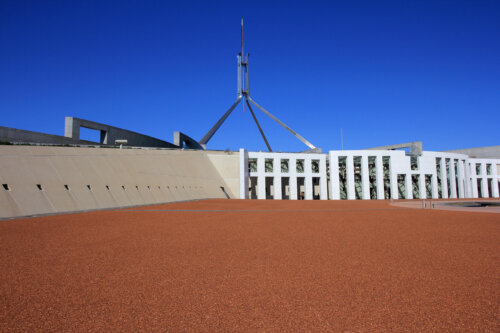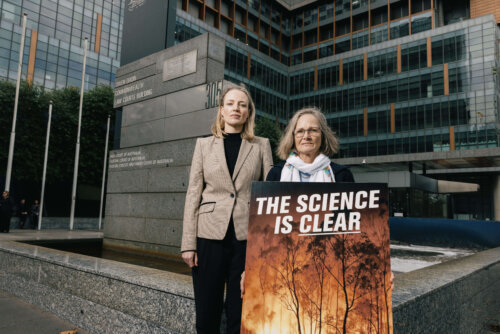The Albanese government is currently trying to push through changes to the Australia’s nature laws, the Environment Protection and Biodiversity Conservation (EPBC) Act.
Yes, they are also delivering the federal budget tonight, and it’s the last Parliamentary sitting week before the election.
There has been no consultation, no committee process to scrutinise the bill, and no real time allocated for Parliamentary debate.
The draft amendment has been tabled, and EJA lawyers are concerned it may have far-reaching consequences.
The government says the controversial changes are being pushed through to shield Tasmania’s salmon industry from a legal challenge over its impact on an endangered fish species, the Maugean skate.
However many civil society groups, including EJA, are concerned the changes have broad application and could have far-reaching consequences.
As well as a carve-out for one polluting industry, these changes also risk undermining environmental assessments to protect nature and our climate, and curb public rights.
As community lawyers, we’re concerned this quiet amendment could be a backdoor way to achieve alarming, wide-scale rollbacks of environmental protections in federal law.
So, what does it mean legally?

“Not only has the Albanese Government backed away from its promise to fix the broken environment laws in this country – it now appears to be quietly removing the ability of community members to scrutinise harmful projects.”
– Elizabeth McKinnon, Environmental Justice Australia Co-CEO
The EPBC Act
The EPBC Act is Australia’s key environment law. It plays a central role in protecting nationally significant places, ecosystems, plants, and wildlife by ensuring that major projects – like coal mines, gas fields, deforestation, and large-scale developments like industrial salmon farms – are properly assessed before approval.
These places, species and ecological communities are called ‘Matters of National Environmental Significance’ under the Act.
The Environment Minister has a legal responsibility to protect Matters of National Environmental Significance (MNES), which include threatened species, World Heritage sites, national parks, and important marine environments.
And what's a controlling provision?
By law, major projects go through a two-step assessment.
- First, the Environment Minister identifies which nationally protected animals, plants, habitats and places a project could impact.
If a project is likely to have a significant impact on a protected threatened species, an ecosystem or place, it is a controlled action and 'controlling provisions' apply, to ensure these likely harms are properly considered before a project is assessed. - Then, in step two, the minister assesses the severity of those risks and whether the project should go ahead.
Before the Minister does step two, section 78A of the EPBC Act allows a person to request the Commonwealth Environment Minister to reconsider a decision about whether an action is a controlled action, and the controlling provisions for the action.
This process is crucial.
If there’s ‘substantial new information’ about environmental risks to protected matters – like fresh scientific data on climate change, new threats to vulnerable species or new evidence that shows the potential harm is different than previously understood – the minister must reconsider what’s at stake before approving a project.
Major projects which could cause irreversible damage should never be assessed based on outdated or incomplete information.
These reconsideration requests are sometimes made by community and environment groups concerned that substantial new information has emerged since the Minister did the first step and the Minister should have regard to up-to-date information on the impacts on nationally protected animals, plants, habitats.
What are the proposed changes?
The government has now tabled its draft amendments.
Despite Prime Minister Albanese claiming these legal changes are targeted at salmon farming at Macquarie Harbour, the draft amendment is not industry or geographically specific.
The proposed amendment therefore creates uncertainty about which circumstances and kinds of decisions the Minister is restricted in reconsidering – and could limit the community’s right to challenge projects where there is significant new information like fresh scientific data on the risk of sending threatened species extinct.
The ramifications of this amendment are unclear and could be applied to other kinds of projects – including coal and gas projects, land clearing and housing or infrastructure.
The amendment provides a set of circumstances where the federal Environment Minister is restricted from overturning a “not a controlled action” decision. These circumstances include:
- Where the Minister has determined a project is "not a controlled action” and in doing so made a decision under section 77A and issued a section 77 notice (that is because the Minister believes it will be taken in a particular manner) AND
- The s 77 notice identifies that the ‘manner’ includes taking in accordance with a management arrangement made/approved/administered by a state or territory government AND
- The action is “being taken” (i.e. already underway) AND
- The way in which the action is being taken has been ongoing or recurring for at least 5 years.
Some things to note regarding these criteria:
- All the criteria have to be met.
- While there are a number of criteria to be met, they could apply to any type or project.
- “Management arrangement” is defined broadly under the EPBC Act as including a policy.
- This means a s 77 notice may meet the criteria if it simply refers to the action being undertaken in accordance with a state government policy and without expressly requiring any state or territory government oversight.
- Action is very broadly defined in s 523 of the Act (including an activity or series of activities) and so depending on the scope of that project referred it is unclear what activities may start the clock on the 5 years.
What actions could meet the criteria, now or in future?
A preliminary search of the EPBC portal reveals a large number of matters – some 900 projects – have been determined “not a controlled action” and received a s 77 notice.
To determine how these amendments will impact these projects, consideration would need to be given to the content of each of the s 77 notice and whether it includes that the action be taken in accordance with a “management arrangement made, approved or administered” by state or territory government. This could include a requirement to act in accordance with a state government ‘policy’.
This amendment could also apply to any future “not controlled action” decisions once they meet the 5 year timeframe of recurring action.

These proposed amendments threaten to strip safeguards away. They could mean the Environment Minister cannot be asked to reconsider past decisions about controlling provisions when there’s new evidence of a significant impact.
What about the salmon farm?
A reconsideration request is currently pending over the impact of Tasmania’s salmon farming industry on the endangered Maugean skate – a prehistoric fish found nowhere else in the world.
A number of environment groups say there is substantial new information that salmon farming is likely to have a devastating impact on skates and their habitat, but the nationally protected threatened species was not listed as a “controlling provision” in the Minister’s earlier decision, which the environment group is asking the Minister to reassess.
Instead of allowing the court process to run its course, Prime Minister Albanese’s office told media the government would legislate “to amend the flawed Environment Protection and Biodiversity Conservation Act to secure jobs and local industries.”

“Proposing new Commonwealth laws to protect a particular industry in a particular harbour in Australia is an extraordinary example of the power of corporate interests in Australia, at the expense of community rights.”

Send the Prime Minister a quick email
As community lawyers, we’re concerned this quiet amendment could be a backdoor way to achieve alarming wide-scale rollbacks of environmental protections in federal law.
Of course, it’s most inconvenient for industry to have their plans properly assessed when they involve significant risks of causing extinction, ecosystem collapse and climate harm.
Inconvenient. But essential.
This is democratic due process – and exactly why we have environment laws.
If you can – send the PM a quick email urging him to protect our laws and strengthen public participation – not gut and silence.
Continue reading...
Our financials
We have a long-standing commitment to sound fiscal management, accountability and transparency.
We encourage you to investigate before you donate.
Join us
The law is a powerful circuit breaker to stop the destruction and make governments and corporations accountable.
Join us and let's build a radically better world.

Make a difference
The challenges we face are vast. The time to push for large-scale system change is now.




